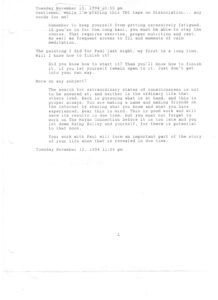[Rita:] I said we want to re-cover the ground covered last year. So let us begin. You will recall, I began by insisting on the unity of all things. Separations are merely relative separations, separations of function perhaps, or even what we might call separations of convenience. Sometimes the only way to look at a thing is to look at any one (or more) separable part of it, in order to bring it into range. You cannot study the world’s oceans all in one place or time, but you can study a drop of seawater in a microscope, or a species of fish in isolation from other aspects of the total “ocean” experience, or the effects on ocean of atmosphere, or any of many other specialized studies. You see? This is what science does – it says, the whole cannot be studied; let us examine it in pieces.
Now, in examining any phenomenon or situation, we may begin from the familiar or the unfamiliar, from the closest or the most remote, from the most similar or the least. Also, we may move into analysis of ever-smaller subdivisions, or analysis (though it will seem to you synthesis) of ever-larger interconnections, larger systems. Ultimately you wind up hedging your inquiry in some way or another – if not by design, then by default, because of constrictions on your time.
You can’t examine everything and so you are forced to choose.
However – and here is the nub of what I want to get across this morning, a simple point that will be obvious to some but a new realization to others – what you examine need not be pieces. You may, if you wish to, examine the whole of reality, and although this means ignoring vast amount of detail, it may be done and done productively.
I think you are saying what we examine is a matter of scale, and we can examine things at a smaller or larger or in-between scale, and whichever way we examine things, we will see only things at that level, because the whole thing would be too much to hold.
Your understanding is correct, because passed mind to mind, but I can not be sure that the understanding has been passed merely by words [in the absence of direct mind-to-mind communication]. It will be worthwhile for you to restate that in different words, just to be sure.
I got an image of a microscope – and I suppose a telescope would be an equally illustrative metaphor. If you look at reality at any given focus level, what you will see will be whatever is in focus at that level, by definition. But that also means, that is all that you will see. Whatever is larger or smaller or farther away in any sense will be as if it did not exist, or existed only as a blur or as a distorting side-effect.
Yes, and so anything you study will exaggerate itself in importance. It is natural for you – for anyone – to tend to lose sight of all of reality outside the area of concentration. It’s just natural – and for that reason, it must be guarded against, for it is not a conscious but an unconscious choosing, hence beyond conscious control.
But, given that you cannot hold the whole in your mind at any one time, and given that anything sufficiently far from your experience will probably be invisible to eyes not expecting to see it, how are you to proceed?
Dropping the body does not thereby allow you to see and understand the entirety of 3D creation, let alone the entirety of All-That-Is. So don’t get your hopes up (and don’t fear) that your curiosity will be satisfied merely by waiting until you are safely dis-incarnated. The part never understands the whole from its own point of view. That’s what a point of view is, a perspective, a place from which to observe everything else from an assumed stable platform.
And so you may ask, in that case, what’s the use of the inquiry?
We cannot see things except from our own point of view. So to look at Rita / TGU / All-That-Is, each layer has its own’ appropriate scale of examination, and each is constricted to that scale – but – at the same time we are intimately connected to the other levels, in the same way a body is intimately connected to trillions of individual cells.
And information and insights may be passed directly between levels, which is a definition of the reason guidance is available and — looked at another way — a definition of the function of humans in 3D.
— From Awakening From the 3D World, available from publisher Rainbow Ridge Books (https://www.rainbowridgebooks.com) or from other booksellers.
